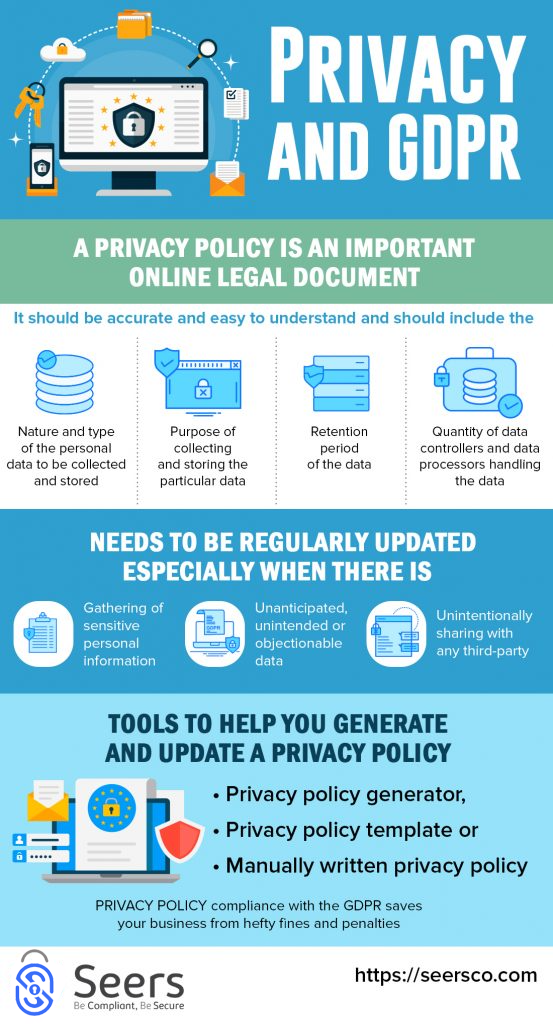The General Data Protection Regulation (GDPR) is a key EU law designed to protect personal data and ensure privacy for individuals within the EU. It applies to organisations that handle the personal data of EU citizens, regardless of their location. Understanding GDPR rules and complying with GDPR privacy policy requirements is crucial for any organisation handling personal data.
What is GDPR Policy?
“A GDPR policy is a formal document that shows how your organisation collects, processes, stores, and protects personal data according to the General Data Protection Regulation law.”
Importance of a GDPR Policy
Here’s why a GDPR policy is so important:
- Compliance: GDPR Policy ensures you meet legal requirements and avoid GDPR fines and penalties.
- Transparency: It communicates how you manage and protect personal data, building trust with customers and stakeholders.
- Risk Management: It helps you identify and mitigate data processing and security risks.

Who Creates a GDPR Policy?
Several key roles are involved in creating a GDPR policy:
- Data Protection Officers (DPOs): They oversee GDPR compliance and ensure your organisation meets GDPR DPO requirements.
- Legal Teams: They provide expertise on GDPR legal requirements and help draft policies in line with GDPR.
- Compliance Officers: They integrate the GDPR policy into your compliance framework.
- IT and Security Teams: They outline GDPR security measures and technical controls.
- Small Organizations: In smaller organisations, the responsibility may fall to the owner or a designated privacy officer.
How Often Should a GDPR Policy Be Updated?
Updating your policy regularly helps keep it effective and in line with GDPR rules.
- Annually: Review it yearly to align with changes in data processing or regulations.
- When Regulations Change: Amend the policy for new data privacy laws.
- After Incidents: Instantly update your practices and notifications after data breaches to stay compliant with GDPR.
- Based on Audit Feedback: Adjust your policies based on findings from GDPR audits to improve GDPR compliance.
Key Components of a GDPR Policy
Your GDPR policy should cover:
- Data Protection Principles: Explain how you adhere to GDPR data protection principles.
- Rights of Data Subjects: This section details the GDPR privacy rights of individuals, like accessing, correcting, and deleting their data.
- Data Processing Activities: It describes how you handle personal data, including what types you use, why you use them, and the legal reasons behind it.
- Data Security Measures: It outline the steps you take to safeguard data, including both technical and organisational protections.
- Data Breach Procedures: It explain how you manage data breaches, including the steps you take to notify individuals and authorities according to GDPR.
- Third-Party Processors: Describe the checks and agreements you have in place for third-party processors.
- Contact Information: Provide contact details for your Data Protection Officer (DPO) or the person responsible for data protection.
Consequences of Not Having a GDPR Policy
Not having a GDPR policy can lead to:
- Financial Penalties: You might face fines of up to €20 million or 4% of global turnover.
- Legal Action: You might face legal consequences from individuals and authorities..
- Reputational Damage: You risk losing trust and facing negative publicity.
- Operational Disruptions: Investigations and audits can disrupt your day-to-day operations.
Implementing a GDPR Policy
To implement a GDPR policy:
- Draft the Policy: Use a GDPR privacy policy template that matches your data processing activities.
- Train Your Team: Make sure your staff understands GDPR and their role in staying compliant.
- Conduct Audits: Regularly check your compliance using a GDPR checklist and GDPR compliance tools.
- Update as Needed: Adjust the policy whenever there are changes in regulations or in your data practices.
Simplify GDPR Compliance with Seers

Seers makes GDPR compliance easy. With our tools, you can:
- Develop a clear and comprehensive GDPR policy
- Regularly update and audit data practices
- Protect personal data and avoid legal penalties
- Ensure customer trust with transparent policies
10 GDPR Compliance Tips
Conduct a Data Audit:
Identify and document all data processing activities. Determine what personal data you collect, how it’s used, and where it’s stored.
Understand Data Subject Rights:
Ensure mechanisms are in place for individuals to exercise their rights: access, rectification, erasure, restriction of processing, data portability, and objection.
Implement Data Protection by Design and Default:
Integrate data protection measures into your systems and processes from the outset. Ensure that only necessary data is collected and processed.
Update Your Privacy Notices:
Provide clear, transparent information about how you process personal data. Include details on data collection, usage, and the rights of data subjects.
Review and Manage Third-Party Contracts:
Ensure that contracts with third-party processors comply with GDPR requirements. Verify that third parties implement adequate data protection measures.
Establish a Data Protection Officer (DPO):
Appoint a DPO if required by GDPR or if it enhances your compliance efforts. The DPO should oversee data protection activities and act as a contact point for data subjects and regulatory authorities.
Implement Data Breach Procedures:
Develop and maintain procedures for detecting, reporting, and responding to data breaches. Ensure timely notification to data subjects and regulators as required.
Conduct Regular GDPR Training:
Train employees on GDPR requirements, data protection principles, and their roles in maintaining compliance. Update training materials as regulations or practices change.
Perform Regular GDPR Audits:
Schedule periodic audits to assess compliance with GDPR and identify areas for improvement. Use audit findings to update policies, procedures, and practices.
Utilise GDPR Compliance Tools:
Leverage tools and software designed to help manage GDPR compliance, such as consent management platforms and data protection impact assessment tools. Ensure these tools align with GDPR standards and integrate well with your existing systems.
GDPR Compliance Checklist
Here’s your go-to checklist to ensure you meet GDPR compliance requirements. Tackle each of these areas to protect personal data and ensure you’re following GDPR rules.
Data Inventory:
Identify and document all your data processing activities. Understand what personal data you collect, how you use it, and where you store it. This is crucial for understanding GDPR data processing and ensuring GDPR data protection.
Data Subject Rights:
Make sure you have processes for individuals to exercise their GDPR privacy rights, including access, correction, deletion, limiting processing, data portability, and objections. Ensure you respect and manage these GDPR data subject rights effectively.
Privacy Notices:
Update your privacy notices to comply with GDPR transparency requirements. Clearly explain what personal data you collect, why you collect it, and how you use it. Make sure your GDPR privacy notice is easy to understand.
Third-Party Contracts:
Review and update your contracts with third-party processors. Ensure these agreements align with GDPR legal requirements and that your third parties adhere to GDPR security measures.
Data Protection Officer (DPO):
Appoint a DPO if it’s required or if it helps with your compliance. The DPO should oversee data protection and be a contact for both individuals and regulators.
Breach Response Plan:
Set up and maintain a robust data breach response plan and notification procedures. Develop clear steps for detecting, reporting, and addressing data breaches and ensure you can meet GDPR breach notification requirements.
Training:
Provide GDPR staff e- training to your employees. Make sure they understand GDPR requirements, data protection principles, and their role in maintaining compliance. Update training as regulations and practices change.
Regular Audits:
Schedule and conduct regular GDPR compliance audits. These audits will help you assess how well you’re meeting GDPR requirements, identify areas for improvement, and ensure ongoing compliance with GDPR data protection policies.
Compliance Tools:
Use GDPR compliance software and tools, like consent management platforms and data protection impact assessment tools. Ensure these tools meet GDPR standards and comply with GDPR rules effectively.
Policy Updates:
Regularly review and update your data protection policies and practices. Ensure that your GDPR policy clearly explains how you handle personal data. Include details on what data you collect, how you use it, and what rights individuals have.
GDPR vs CCPA
You’ve likely come across GDPR and CCPA while dealing with data protection laws. Both are essential for protecting personal data, but they differ in key ways.
| Aspect | GDPR | CCPA |
| Jurisdiction | GDPR applies to organisations that handle the personal data of EU citizens, no matter where they are based. | CCPA applies to businesses collecting personal data of California residents, regardless of location. |
| Scope | Covers all personal data, including sensitive information. | It focuses on personal data and includes consumer rights around sharing and sales. |
| Consent Requirements | Requires explicit consent before processing personal data. You must ensure that GDPR consent is obtained and documented. | It does not require prior consent for data collection, but you must offer opt-out options for data sales. |
| Consumer Rights | Provides extensive rights, including access, rectification, erasure, restriction, data portability, and objection. | It offers rights such as access, deletion, and opt-out of data sales. However, compared to GDPR, it does not provide data portability. |
| Data Protection Officer | It requires appointing a Data Protection Officer (DPO) to monitor compliance. | There is no specific requirement for a Data Protection Officer, but having one can be beneficial. |
| Data Breach Notifications | Requires notification within 72 hours of discovering a breach. | Requires notification to affected consumers and the California Attorney General within 30 days. |
| Enforcement | Fines up to €20 million or 4% of global turnover for non-compliance. | Fines up to $7,500 per violation, with enforcement handled by the California Attorney General. |
| Data Protection by Design | Mandates data protection by design and by default, integrating it into processes from the start. | Encourages data protection practices but doesnot mandate integration by design. |
| Opt-Out Rights | No specific opt-out rights related to data sales. | It gives consumers the right to opt-out of data sales and request deletion of their data. |
| Privacy Notices | Requires detailed GDPR privacy notices explaining data collection, usage, and rights. | Requires clear privacy notices outlining data collection practices and consumer rights. |
Conclusion
A strong GDPR policy is key to protecting personal data and meeting EU GDPR regulations. By following GDPR data protection principles, recognising GDPR privacy rights, and effectively managing GDPR consent, you can safeguard privacy, build trust, and avoid penalties. For custom GDPR solutions and to ensure your policy is up-to-date, visit Seers for information on GDPR compliance software, GDPR audit processes, and GDPR privacy impact assessments.
Secure Your Data with a Comprehensive GDPR Policy
Seers Overview:
- Seers offers an all-in-one GDPR compliance platform, simplifying the creation and management of GDPR policies.
- Our platform enables you to develop, implement, and update your GDPR policy effortlessly while ensuring comprehensive data protection.
Founding Purpose:
- Our goal is to make GDPR compliance easier for businesses like yours, allowing you to focus on growth while staying aligned with data protection laws.
Passion and Motivation:
- We are dedicated to data privacy and are committed to making GDPR compliance straightforward and effective.
- Our solutions empower you to meet legal obligations and build trust with your customers.
What We Offer:
- Tailored GDPR policy templates
- Tools for regular GDPR audits and policy updates
- Automated GDPR compliance tasks
- Easy management of third-party data processors
Ready to safeguard your data and stay compliant with GDPR?
Book You Demo Now
